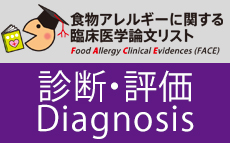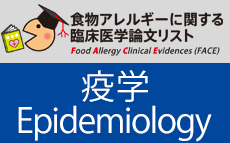ピーナッツ感作とアレルギー:早期のピーナッツ暴露による影響/Peanut sensitisation and allergy: influence of early life exposure to peanuts.
更新日:2016年10月21日
| Author: | Thompson RL1, Miles LM, Lunn J, Devereux G, Dearman RJ, Strid J, Buttriss JL. |
|---|---|
| Title: | Peanut sensitisation and allergy: influence of early life exposure to peanuts. |
| Citation: | British Journal Nutrition. 2010 May;103(9):1278-86. |
| URL: | https://pubmed.ncbi.nlm.nih.gov/20100372/ |
| Abstract: | The aim of the present systematic review was to evaluate the influence of early life exposure (maternal and childhood) to peanuts and the subsequent development of sensitisation or allergy to peanuts during childhood. Studies were identified using electronic databases and bibliography searches. Studies that assessed the impact of non-avoidance compared with avoidance or reduced quantities of peanuts or peanut products on either sensitisation or allergy to peanuts, or both outcomes, were eligible. Six human studies were identified: two randomised controlled trials, two case-control studies and two cross-sectional studies. In addition, published animal and mechanistic studies, relevant to the question of whether early life exposure to peanuts affects the subsequent development of peanut sensitisation, were reviewed narratively. Overall, the evidence reviewed was heterogeneous, and was limited in quality, for example, through lack of adjustment for potentially confounding factors. The nature of the evidence has therefore hindered the development of definitive conclusions. The systematic review of human studies and narrative expert-led reviews of animal studies do not provide clear evidence to suggest that either maternal exposure, or early or delayed introduction of peanuts in the diets of children, has an impact upon subsequent development of sensitisation or allergy to peanuts. Results from some animal studies (and limited evidence from human subjects) suggest that the dose of peanuts is an important mediator of peanut sensitisation and tolerance; low doses tend to lead to sensitisation and higher doses tend to lead to tolerance. |
| 邦文タイトル: | ピーナッツ感作とアレルギー:早期のピーナッツ暴露による影響 |
| 一般向け要約 | この系統的レビューは乳児期早期の母と児に対するピーナッツ暴露が小児期のピーナッツの感作およびアレルギー発症についてどう影響するかを評価するのがもくてきである。 電子データベースと参考文献から、ピーナッツや加工品の摂取群と、除去群や減量群との感作およびアレルギー発症を比較しているものを選択した。 2つの無作為比較試験、2つの症例対照研究、2つの横断研究の計6つのヒトを対象にした研究が見つかった。ピーナッツの早期暴露がピーナッツ感作やその後のアレルギー発症に影響を及ぼすかどうかの関連性について概説した動物実験の総説も見つかった。それらは内容にばらつきがあり、研究の質に限界があったためはっきりとした結論は出ていない。ヒトを対象にした研究の系統的ビューと動物実験の総説では、母のピーナッツ暴露、児の早期のピーナッツ経口摂取を早めるあるいは遅らせることのいずれもピーナッツの感作及びアレルギー発症につながるというエビデンスがはっきりと明示されていない。またいくつかの動物実験は、ピーナッツの用量が感作と寛容の重要なメディエーターであることを示唆しており、低用量は感作に、高用量が寛容につながるという傾向がある。 |
| 専門医コメント | この検討では、母のピーナッツ暴露群、ピーナッツ除去群、また児のピーナッツ早期導入群、遅延導入群 各々に関してのピーナッツ感作もしくはアレルギー発症への関連性についての明らかなエビデンスを示すことはできませんでした。これをうけて欧米の治療ガイドラインは、母の妊娠中や授乳中のピーナッツ摂取を避けることや児のピーナッツ摂取開始を遅くすることには根拠がないとしています。 |


